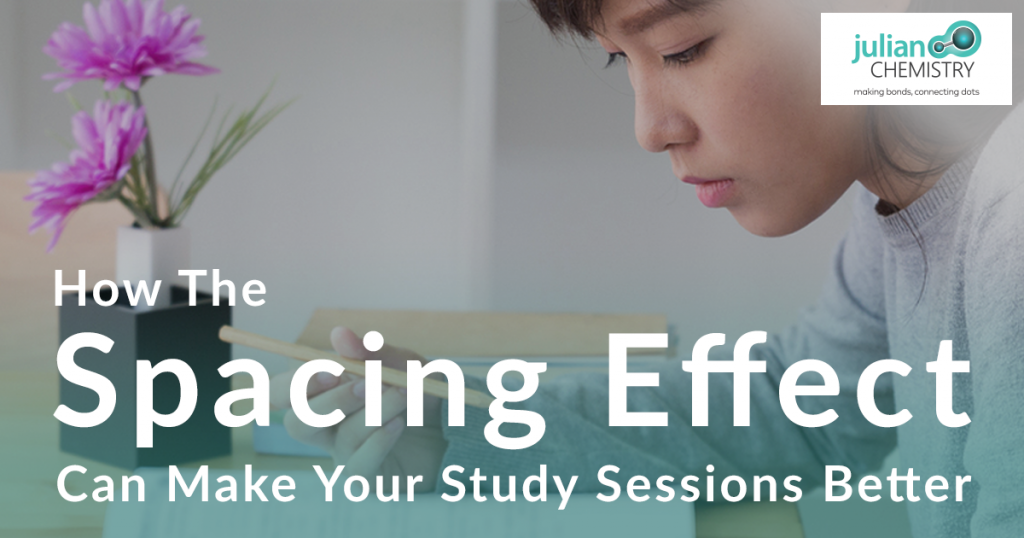How the Spacing Effect Can Make Your Chemistry Study Sessions Better
Receiving the Stanford University Terman Award
May 3, 2018Note-Taking Skills for Chemistry and Other Classes
July 9, 2018
Chemistry in both the O or A levels can be a tough subject to master. That’s why many students opt for chemistry tuition in Singapore – they recognise that they need help with the complexities of chemistry. With a chemistry tutor that has the right credentials, learning and studying can be fascinating, or even fun! Just remember to follow smart study strategies, like the spacing effect. Explore how the spacing effect can make your study sessions much more effective.
The Problem with Cramming
Have you heard the term “cramming” used in reference to studying? Cramming refers to packing as much knowledge as possible into your head within a period of time. It’s when you dig in and intensely focus on your studies, studying as hard as you can and packing facts and figures into your brain.
This type of studying can be effective in the short term. You might do fairly well on one quiz or test— but afterwards, you find all the information floating away, out of your mind. You didn’t practice good study techniques, so you don’t have a firm mental grasp on the material. That means when it’s time for the next text or quiz, you’re going to have to re-learn everything you just studied, plus any new material. It’s a lot of pressure, and it takes all the enjoyment out of truly learning the subject.
Cramming is also called “blocking” or “massed learning,” and according to research, it’s really not the ideal way to learn. According to Robert Bjork, chair of the Psychology Department at the University of California in Los Angeles, “massed practice will lead to …very poor retention. So as far as the material in that course carrying over to other courses, to your life in general, it’s an awful thing to do.”
You’re going to need chemistry concepts in the future, both in your daily personal life and perhaps your workplace. It would be a terrible thing to spend time and money on chemistry tuition, only to lose the benefits by failing to study the right way.
The Benefits of Spaced Repetition
A better way to learn is through spaced repetition. Some call it the “spacing effect” or “spaced practise.” In essence, it means learning and reviewing the material in short bursts, with longer spaces of time between them.
It may seems counterintuitive. If you leave space between your study sessions, won’t you forget what you learned in the interim? Studies show that to be a false assumption – in fact, the space between study sessions is actually good for your brain. Sure, you may not remember everything from the previous session; but the more often you do your spaced practice, the more you’ll remember each time. Better yet, the things you learn will stay with you much longer than if you were cramming for an exam.
How to Space Your Studies
The way that you space your studies depends on how much time you have before your next quiz or exam. Identify the day and time of the exam, then count how many days you have until then. Figure out when you will have some blocks of time to study. You might have more than one exam coming up, so you’ll need to divide up the available study time between subjects.
On Day 1, you might study chemistry or do chemistry tuition for an hour and a half. Give your brain a break for a day; and then on Day 3, put in another hour of study. Skip another day. On the fifth day, you can put in one more hour of study; and then on test day, you’ll have half an hour to review before taking the exam. That schedule gives you four hours of study time in total.
If you have more time, you can add more study sessions and place them a couple days apart. Having two months or two weeks to study is far better than having 5 days – so make sure you plan ahead and begin building your foundation of knowledge long before the day of the test.
Other Study Methods to Try
Try adding some variety into your study sessions. Make massive stacks of flashcards and go through them all a couple of times. The bigger the stack, the more time will elapse before you return to the first flashcard; and that’s actually better for retention and memory.
Are you really struggling with a concept? Create a painting or a work of art that illustrates something about the concept. Study it while listening to instrumental music. Incorporate technology and physical activity into the study process as appropriate, or as suggested by your chemistry tutor.
Write the concepts, read them silently, and read them aloud. Record yourself reading the material and then play back the recording. That way, you’re combining the movement of writing with visual and auditory learning.
Vary the locations of your study sessions as well. Perhaps you could study alone in a quiet room one day, and then study in a park or other green space the next day. According to research quoted in the New York Times, variety actually aids learning.
The Scoop on the Spacing Effect
Whenever you have an exam coming up, plan as far in advance as possible. If you can, include a day or two between each study session, to give your brain time to begin forming a network of associations connected to the knowledge that you just learned.
At Julian Chemistry, we recognise the value of the spacing effect, and we support the incorporation of technology, blended learning, and connections with everyday life. Chemistry tuition works best when the whole student is fully involved in learning, and spaced repetition is one way to ensure that the time and effort doesn’t go to waste. For more about learning that lasts for a lifetime, visit the our website or contact us today.



